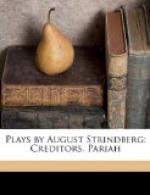Gustav. Pardon me for recalling what you said at the beginning of our talk—that she had never taken anything from you.
Adolph. She doesn’t nowadays. Because there is nothing more to take.
Gustav. The snake being full, it vomits now.
Adolph. Perhaps she has been taking a good
deal more from me than
I have been aware of?
Gustav. You can be sure of that. She took when you were not looking, and that is called theft.
Adolph. Perhaps she never did educate me?
Gustav. But you her? In all likelihood! But it was her trick to make it appear the other way to you. May I ask how she set about educating you?
Adolph. Oh, first of all—hm!
Gustav. Well?
Adolph. Well, I—–
Gustav. No, we were speaking of her.
Adolph. Really, I cannot tell now.
Gustav. Do you see!
Adolph. However—she devoured my faith also, and so I sank further and further down, until you came along and gave me a new faith.
Gustav. [Smiling] In sculpture?
Adolph. [Doubtfully] Yes.
Gustav. And have you really faith in it? In this abstract, antiquated art that dates back to the childhood of civilisation? Do you believe that you can obtain your effect by pure form—by the three dimensions—tell me? That you can reach the practical mind of our own day, and convey an illusion to it, without the use of colour—without colour, mind you—do you really believe that?
Adolph. [Crushed] No!
Gustav. Well, I don’t either.
Adolph. Why, then, did you say you did?
Gustav. Because I pitied you.
Adolph. Yes, I am to be pitied! For
now I am bankrupt! Finished!—
And worst of all: not even she is left to me!
Gustav. Well, what could you do with her?
Adolph. Oh, she would be to me what God was before I became an atheist: an object that might help me to exercise my sense of veneration.
Gustav. Bury your sense of veneration and let something else grow on top of it. A little wholesome scorn, for instance.
Adolph. I cannot live without having something to respect—–
Gustav. Slave!
Adolph.—without a woman to respect and worship!




